Encoders
This page explains how to set up encoder operators for kdb Insights Enterprise pipelines using the Web Interface.
Encoding allows data to be converted into a format that can be passed to an external system either by writing the content to a static file or by streaming the data to a different system.
Tip
See APIs for more details
Both q and Python interfaces can be used to build pipelines programmatically. See the q and Python APIs for details.
The pipeline builder uses a drag-and-drop interface to link together operations within a pipeline. For details on how to wire together a transformation, see the building a pipeline guide.
Arrow
(Beta Feature) The Arrow operator encodes kdb Arrow data.
Note
Beta - For evaluation and trial use only
This feature is currently in beta.
-
Refer here to the standard terms related to beta features
-
We invite you to use this beta feature and to provide feedback using the Ideas portal
-
During deployment, the entitlements feature is disabled by default, meaning no restrictions are applied and you can manage all databases, pipelines, and views as well as query all data in a kdb Insights Enterprise deployment
-
When you enable the feature, you do not have access to query data in a database unless you have been given a data entitlement to query the database in question
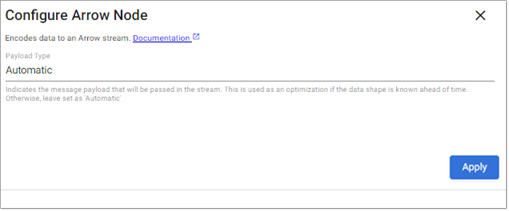
Note
q and Python APIs: .qsp.encode.arrow
Optional Parameters:
|
name |
description |
default |
|---|---|---|
|
Payload Type |
Indicates the message payload that is passed in the stream. This is used as an optimization if the data shape is known ahead of time. Otherwise, leave set as |
|
Avro
The Avro encoder converts kdb+ objects into Avro data messages.
You must provide an Avro schema object as an argument and optionally the desired message encoding.
Note
Beta - For evaluation and trial use only
This feature is currently in beta.
-
Refer here to the standard terms related to beta features
-
We invite you to use this beta feature and to provide feedback using the Ideas portal
-
During deployment, the entitlements feature is disabled by default, meaning no restrictions are applied and you can manage all databases, pipelines, and views as well as query all data in a kdb Insights Enterprise deployment
-
When you enable the feature, you do not have access to query data in a database unless you have been given a data entitlement to query the database in question
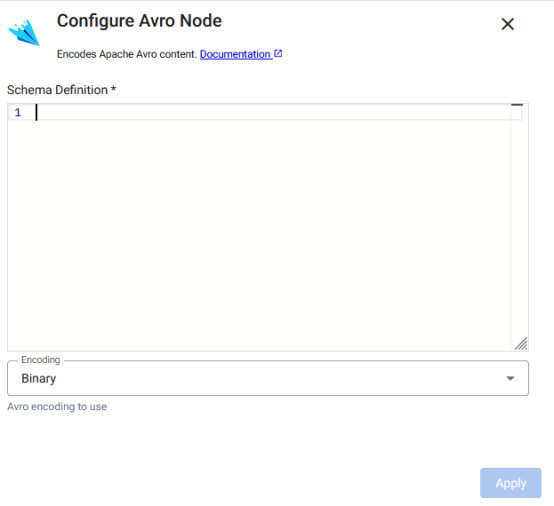
Note
q and Python APIs: .qsp.encode.avro
Required Parameters:
|
name |
description |
default |
|---|---|---|
|
Schema |
A schema definition indicating the Avro message format to be encoded. |
|
Optional Parameters:
|
name |
description |
default |
|---|---|---|
|
Encoding |
Indicates whether to encode data as Avro |
|
CSV
This operator converts data into CSV format.
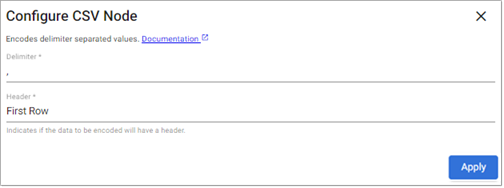
Note
q and Python APIs: CSV
Required Parameters:
|
name |
description |
default |
|---|---|---|
|
Delimiter |
Field separator for the records in the encoded data |
,
|
Optional Parameters:
|
name |
description |
default |
|---|---|---|
|
Header |
Indicates whether encoded data should start with a header row. Options are |
|
JSON
The JSON operator serializes data into JSON format.
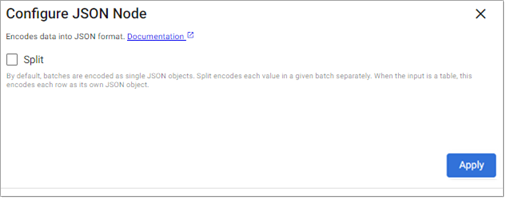
Note
q and Python APIs: JSON
Optional Parameters:
|
name |
description |
default |
|---|---|---|
|
Split |
By default, batches are encoded as single JSON objects. Split encodes each value in a given batch separately. When the input is a table, this encodes each row as its own JSON object. |
No |
Protocol Buffers
The Protocol Buffers operator serializes data into Protocol Buffers.
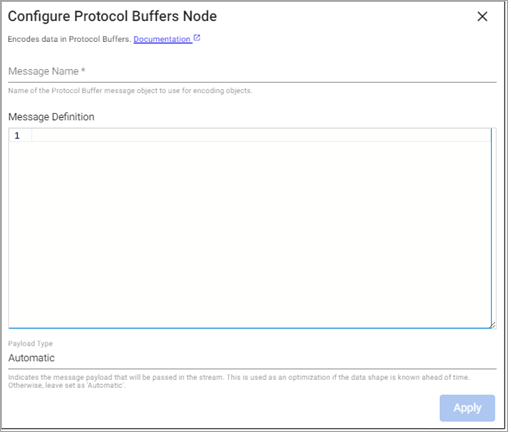
Note
q and Python API: Protocol Buffer
Required Parameters:
|
name |
description |
default |
|---|---|---|
|
Message Name |
The name of the Protocol Buffer message type to decode |
|
|
Message Definition |
A |
|
Optional Parameters:
|
name |
description |
default |
|---|---|---|
|
Payload Type |
Indicates the message payload that will be passed in the stream. This is used as an optimization if the data shape is known ahead of time. Otherwise, leave set as |
|